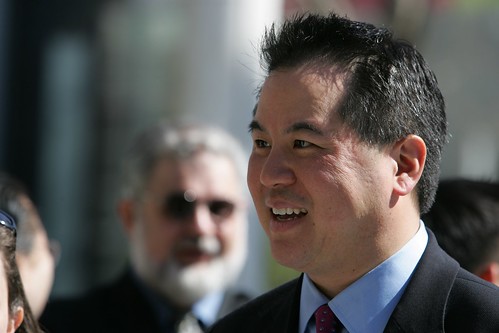 Democrats fought to regain power over the past decade, we have seen a sophisticated online infrastructure develop, mature and help us win elections.
Democrats fought to regain power over the past decade, we have seen a sophisticated online infrastructure develop, mature and help us win elections.
I’ve experienced the tremendous power of the online community with a statewide campaign I’m involved in, www.CloseTheLoophole.com, which has quickly organized more than 25,000 Californians to support closing loopholes in Proposition 13.
Thanks to pioneers like Governor Howard Dean, netroots leaders like DailyKos and Calitics and energized social networks, we know how to use online infrastructure to draw attention to issues and campaigns. But as hard as it was to win back control of the White House and Congress, and as hard as it will be to keep control this year, the hardest part isn’t just winning elections – it is making those victories meaningful from a policy perspective.
And that’s why I think we need to focus on closing the gap between the people-powered emphasis of our campaigns and the more elite-driven emphasis of much of our governing style.
For example, as good as our healthcare law is, and as much as it will do for California, I think it would have been much more comprehensive if the President had been paying as much attention to his netroots supporters during those deliberations as he did during the campaign. The reality is that a continued engagement of his powerful online army in the forming of policy would have helped build support for even greater healthcare reforms, like the public option.
We see the same disconnect here at home in California – with a surge of interest and support during campaigns and then a noticeable drop-off in engagement after the ballots are counted. Part of this is natural. Voters engage during campaigns and then want to get back to their lives and let their elected officials do their jobs.
But part of this drop off happens because many candidates, who ask for help so often during campaigns, largely ignore the communities they have built until the next election.
Frankly, I think we would have a much better and braver government if more people were involved in shaping policy. And using online communities to help identify problems, propose solutions and then stand up to the special interests that so often resist reform is more necessary than it has ever been.
I have said at events in San Francisco that the single most progressive step we can take right now is to make sure government works. From my perspective as a local elected official, I think that when voters see their bus come on time, their school succeed, their libraries open and their parks and playgrounds clean they become much more supportive of a broader progressive agenda that is fundamentally premised on the idea that government can succeed in solving problems.
As I looked around for ways to promote User Generated Government, I didn’t see many models that felt exactly right. There are certainly some good examples out there – but they are either national in scope or they seemed more like ways to gain support for specific ideas rather than a forum to empower an ongoing community.
So, lacking a model I thought appropriate for our local needs, we’ve tried to create our own model. It is called www.ResetSanFrancisco.org, and it is an experiment in user-generated government on a local level.
We have a long way to go. But already nearly 1,000 folks have joined us in a discussion of policy, to propose good ideas and to offer suggestions about how we can make the community even stronger.
Clearly, this is just a start in one small city. It only includes those who can get online, which is not nearly enough people. It is only focused on San Francisco. And so far, it is only in English (although that will soon be expanded). But it is a start. And we are gathering to celebrate that start this weekend.
If you are in the neighborhood, come by to celebrate the launch of Reset San Francisco this Saturday. And if you have time, stay and help us discuss how we can create a community that does more than win elections. Help us show how online communities can stay engaged to win the most important battles – the fight for better policy.
